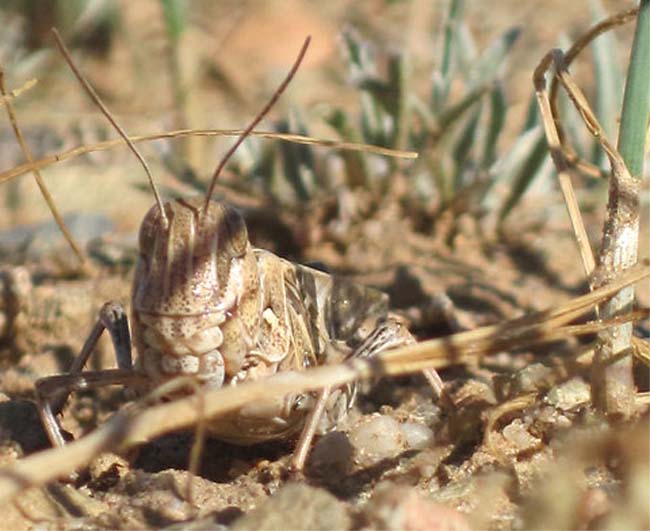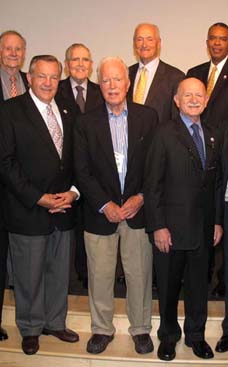
Ms. Cease set about deciphering the grasshoppers' nutritional requirements, raising them on a variety of outdoor plots, including some that were well fertilized and others that were heavily grazed by sheep. Plants in the former were high in nitrogen, a nutrient necessary for making protein; vegetation in the latter was nitrogen-poor. Contrary to her expectations and those of other researchers in the field, the insects raised on the overgrazed land did much better, surviving at greater frequency and growing more quickly than those raised on fertilized plants. "It was quite a surprise," Ms. Cease said. The results of her study, published last week in the journal Science, link the overgrazing of land in Central Asia to the emergence of swarms of these grasshoppers. The study found that these grasshoppers prefer a lower portion of nitrogen, or protein, than any other species studied, challenging the existing belief that insect herbivores are limited by the amount of protein found in plants. Ms. Cease performed lab experiments that confirmed her field measurements. By reducing the nitrogen content of grasses, grazing provides the insects with a better environment to multiply in and form swarms. James Elser, a co-author of the study and a professor of evolutionary ecology at Arizona State, suggested that an understanding of this relationship could lead to improvements in land management practices to reduce the locust threat, like rotating grazing animals into different areas before the ground is overtaxed.
Senegal RPCV Arianne Cease decided to study locusts, enrolling as a doctoral student at Arizona State University and eventually leading a research project in Inner Mongolia in China
For Locusts, Overgrazed Land Is a Treat
By DOUGLAS M. MAIN
Green: Science
Locusts, one of the 10 plagues of biblical lore, remain a real threat to survival for farmers around the world. From 2003 to 2005, for example, swarms of the desert locust decimated crops throughout West Africa, causing at least $2.5 billion in lost harvests. It cost $400 million to bring under control, according to the Food and Agriculture Organization of the United Nations.
An Oedaleus asiaticus locust in its grassland habitat, a heavily grazed field in Inner Mongolia.Arianne CeaseAn Oedaleus asiaticus locust in its grassland habitat, a heavily grazed field in northeastern China.
In 2005, Arianne Cease traveled to Senegal as a Peace Corps volunteer, working to develop sustainable agroforestry practices like the use of living fences and windbreaks. The village in which she was stationed, near Kaffrine, was still recovering from the locust invasion, which had finally been contained.
Without warning, another type of grasshopper swarmed into the area, and within a few months the insects had eaten just about every living plant in sight, Ms. Cease said in a phone interview. She said she was frustrated to witness another setback for the subsistence farmers who had so warmly welcomed her - and as a result, she embarked on a career shift.
Ms. Cease decided to study locusts, enrolling as a doctoral student at Arizona State University and eventually leading a research project in Inner Mongolia in China. Her goal was to better understand the ecology and diet of the pesky Oedaleus asiaticus, or Chinese grasshopper, whose numbers have soared in recent decades in the vast grasslands of central Asia.
Ms. Cease set about deciphering the grasshoppers' nutritional requirements, raising them on a variety of outdoor plots, including some that were well fertilized and others that were heavily grazed by sheep. Plants in the former were high in nitrogen, a nutrient necessary for making protein; vegetation in the latter was nitrogen-poor.
Contrary to her expectations and those of other researchers in the field, the insects raised on the overgrazed land did much better, surviving at greater frequency and growing more quickly than those raised on fertilized plants.
"It was quite a surprise," Ms. Cease said. The results of her study, published last week in the journal Science, link the overgrazing of land in Central Asia to the emergence of swarms of these grasshoppers.
The study found that these grasshoppers prefer a lower portion of nitrogen, or protein, than any other species studied, challenging the existing belief that insect herbivores are limited by the amount of protein found in plants. Ms. Cease performed lab experiments that confirmed her field measurements.
By reducing the nitrogen content of grasses, grazing provides the insects with a better environment to multiply in and form swarms. James Elser, a co-author of the study and a professor of evolutionary ecology at Arizona State, suggested that an understanding of this relationship could lead to improvements in land management practices to reduce the locust threat, like rotating grazing animals into different areas before the ground is overtaxed.
Yet a next-best approach might be to fertilize grasslands in certain situations to avoid an imminent swarm, Dr. Elser said. This may not be ideal, given that nitrogen runoff from fertilizer is a problem in much of the world, he said, but it beats the often careless spraying of insecticides that accompanies locust outbreaks. "If a farmer has crops that are being descended upon, the pesticides come out, for sure," he said.
All locusts are grasshoppers, but not all grasshoppers are locusts. Only about 20 species of grasshoppers out of about 10,000 known can be considered locusts, based on a trait that has evolved independently several times, Ms. Cease said. When conditions are right - for instance, when it's moist and warm - these grasshoppers enter a gregarious phase, grouping together when they formerly avoided each other and forming the massive swarms.
Adult locusts can eat their weight in plant matter in a day, Ms. Cease said. A swarm the size of Manhattan could eat as much food in one day as everyone in New York and Pennsylvania combined, said Keith Cressman, a senior locust forecasting officer in Rome for the Food and Agriculture Organization of the United Nations..
When the locusts revisited the countryside in Senegal, Ms. Cease saw firsthand how much of a struggle it was to control them. "For the few that could afford it, unidentified bags of powdered pesticides went into water buckets and were stirred with hands before being applied around the villages, but this did not stop the grasshoppers," she said.
Still, the forecasting and prevention of locust swarms has improved in many ways in recent years, said Mr. Cressman, who receives daily reports on grasshopper numbers from people throughout the world. He also monitors climatic conditions that might be favorable to outbreaks, issuing warnings and guidelines throughout Africa and Asia.
It is important to catch the locust problem early; once there is a sizable swarm, it may be too late, he said.
The last true locust plague, defined as the presence of enormous swarms crossing multiple regions and continents, occurred from 1987 to 1989, with clouds of hoppers ranging from West Africa to southwestern Asia. It took several years and $300 million to stop them.
During these plagues, the insects can be found across 20 percent of the Earth's surface, affecting the livelihoods of one in 10 people on the planet across 60 countries, Mr. Cressman said.
















